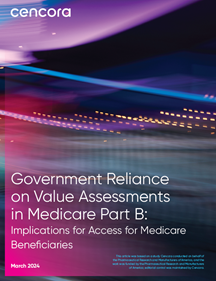Government Reliance on Value Assessments in Medicare Part B
By AmerisourceBergen
Implications for Access for Medicare Beneficiaries
Over time, US payers have increasingly relied on the Institute for Clinical and Economic Review’s (ICER) recommendations to inform decision-making. ICER’s value assessments continue relying on cost per quality-adjusted life-year (QALY) cost-effectiveness analyses (CEAs) despite well-documented concerns over the metric. In 2018, Cencora examined how the blunt implementation of cost-effectiveness methods and findings, such as those employed by ICER, could affect patient access to medications. Cencora built upon the 2018 study and re-examined the original therapeutic areas including multiple sclerosis (MS), non-small cell lung cancer (NSCLC), and multiple myeloma (MM), rheumatoid arthritis (RA), and added asthma, a therapeutic area recently assessed by ICER, to understand how patients may continue to be impacted in 2020.
Cencora analyses found that if the Centers for Medicare & Medicaid Services (CMS) were to apply the value assessments from the Institute for Clinical and Economic Review (ICER) as the basis for coverage policy for Medicare Part B in 5 serious, complex conditions, 63% of patients would face access barriers to clinically important physician-administered treatments.
Download our issue brief to read the full findings from the analyses.
Download our issue brief to read the full findings from the analyses.

Topics:
Consulting
Regulatory






